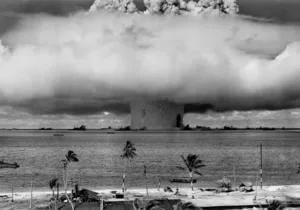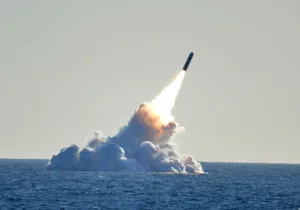In May, I had the wonderful opportunity to teach a week-long introduction to Christian ethics class at New Orleans Baptist Theological Seminary (with some wonderful students, I’d add).
Toward the end of the week’s lectures and discussions, we got to the topic of nuclear weapons, which, I’ll confess, has endlessly fascinated me long before I ever took up the idea of doing ethics professionally. The idea that weapons exist that could ensure almost-total human carnage is more than the mind can fathom. The use of nuclear weapons is an incredibly complicated topic in the field of ethics and modern warfare, to say the least. Under what conditions, if ever, could a nuclear weapon’s use be justified?
The purpose of my post is not to state or re-litigate whether the United States was right or wrong in its use of nuclear weapons against Japan in World War II. What I want to draw our attention to is the method of how we evaluate difficult situations from particular vantage points that those in the crucible of decision do not have.
My ethics class was divided on whether the United States was justified in its use of the atom bomb. After the class concluded, I realized that I had not ever read any historical account of the reasons for why President Harry Truman decided to use the atomic bombs on Hiroshima and Nagasaki, so I purchased Wilson Miscamble’s The Most Controversial Decision: Truman, The Atomic Bombs, and the Defeat of Japan. Several factors went into Truman’s decision, including (but not limited to) (1) the catastrophic human loss that an invasion of Japan’s mainland would require, (2) a realization that Japan would continue to fight to the point of futile oblivion, even if they could never win the war, and (3) ending the war with overwhelming decisiveness.
What was apparent from Miscamble’s book was that Roosevelt and Truman never doubted whether the bomb would be used if it could be developed (shockingly, I learned that Truman was not aware of the atomic bomb’s development until he came to office after Roosevelt’s death). To their thinking, the war must be ended, and a weapon that could bring a nation to its heels would save lives and bring peace. Miscamble argues that Roosevelt, Truman, and their advisors did not fully grasp the tectonic paradigm shift for weaponry and warfare that the introduction of nuclear weapons would bring. They did, afterward. Staring at a bleak future of attritional war, they conceived of the atomic bomb as a very powerful and efficient bomb, not as a weapon that would pose a threat to humanity’s future and realign global power according to those who have and those who lack the bomb.
But what struck me about reading The Most Controversial Decision is how we now superimpose our judgments on Truman’s decision post hoc, and we do this with great zeal, certainty, and righteous superiority. We frame our ethical analysis after-the-fact: “Had Truman had our knowledge, of course, he would have done X.” The problem with this sort of statement is that its posture can shift depending on the action pursued. Depending on whom you speak with, Truman’s decision was a legitimate, yet costly concession to preventing even more death and carnage. Others view the atomic bomb as entirely illegitimate, as its use completely erases the line between combatant and non-combatant.
I am not saying, of course, that agnosticism about the future must leave us in a position of indecision, or that the unknown future allows us to commit known evils in the present. The point is merely to argue that historical evaluation often assumes an epistemological vantage point that privileges one view over another. Consider a counter-factual: What if Truman had not used the atomic bomb on Japan and the war continued for six years with an additional 3.2 million Japanese causalities and 850,000 American causalities? How would our moral judgment then asses Truman’s decision not to use the atomic bomb?
We are privileged with knowledge and perspective Truman did not yet possess and could not have as a fallible human being. This calls for a humility in our ethical-historical assessments.
To be sure, a natural fact of ethical judgment is its post hoc nature. Looking backward, historical review of past actions provides us the ability to render certain actions as good or bad. This is just intuitive and commonsensical. We are retrospective creatures, and to dismiss post hoc ethical analysis outright is to dismiss the ability to render moral judgment.
Again, I’m not going to state my position on whether the use of the atomic bomb in World War II was justified, or whether it’s ever justified. This is a plea for caution in offering strident post hoc judgments on actors who were limited by the knowledge they had at the time their decisions were made. To insist that Truman was either a moral monster or a patriot’s patriot is to reflexively play by zero-sum ethics. Ethical post hoc judgment needs to be attentive to the context-specific knowledge at the time ethical decisions were first made. Ethics, surely, are not “situational,” but situations ought to, nonetheless, color the ways that history looks backward. Since none of us can conceive of history’s future verdicts on us in the present, let us walk a path of wisdom—knowing personal fallibility and future judgment awaits us all.
Andrew T. Walker is Senior Fellow in Christian Ethics at The Ethics and Religious Liberty Commission and Assistant Professor of Christian Ethics and Apologetics at The Southern Baptist Theological Seminary.






